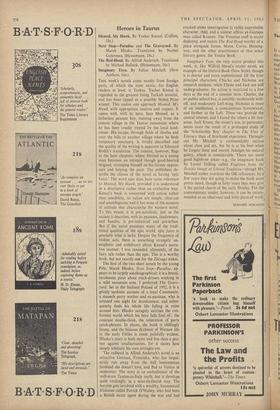Heroes in Taurus
Next Stop—Paradise and The Graveyard. By
The Red-Head. By Alfred Andersch. Translated Authors, 16s.)
THIS week's novels come mostly from foreign parts, of which the most exotic, for English readers at least, is Turkey. Yashar Kemal is regarded as the greatest living Turkish novelist, and has been tipped as a possible Nobel Prize winner. This makes one approach Memed, My Hawk with appropriate caution and respect. It opens well, with its hero, Ince Memed, as a fatherless peasant boy, running away from the remote village in the Taurus mountains where he has been cruelly treated by the local land- owner. His escape, through fields of thistles and over the hills to another village where he finds temporary sanctuary, is vividly described and the quality of the writing is apparent in Edouard Roditi's translation. The interest, however, flags in the later chapters, where Memed as a young man becomes an intrepid though good-hearted brigand, revenging himself on his former oppres- sors and helping the poor. The publishers de- scribe the climax of the novel as having `epic force.' The word epic does have some relevance to Mewed, My Hawk, provided it is understood in a descriptive rather than an evaluative way. Kemal's book is concerned with action rather than sensibility, its values are simple, clear-cut and unambiguous, and it has none of the nuances of attitude that characterise the western novel. To this extent, it is pre-novelistic, just as the society it describes, with its peasants, landowners, and bandits, is pre-industrial and pre-urban. But if the novel possesses many of the tradi- tional qualities of the epic world, epic force is precisely what it lacks. Despite the frequency of violent acts, there is something strangely un- emphatic and withdrawn about Kemal's narra- tive manner. I was reminded, ultimately, of the fairy tale rather than the epic. This is a worthy book, but not exactly one for the Zhivago stakes.
The first of the two short novels by the young Pole, Marek Hlasko, Next Stop—Paradise, ap- pears to be largely autobiographical; it is a brutal, incoherent piece about truck-drivers working in a wild mountain area. I preferred The Grave- yard. Set in the Stalinist Poland of 1952, it is a grimly sardonic account of a loyal Communist, a staunch party worker and ex-partisan, who is arrested one night for drunkenness, and subse- quently finds his whole life falling in ruins around him. Hlasko savagely satirises the con- formist world which his hero falls foul of : the constant double-think, the reiteration of party catch-phrases. In places, the book is chillingly funny, and the hideous drabness of Warsaw life in the early Fifties is made painfully evident. Hlasko's story is both more and less than a pro- test against totalitarianism, for it shows how deeply nihilistic his own attitudes are.
The redhead in Alfred Andersch's novel is an attractive German, Franziska, who has impul- sively run away from the dull businessman husband she doesn't love, and fled to Venice in midwinter. The story is an embodiment of the well-worn Teuton-in-Italy myth, but it develops quite excitingly, in a semi-thrillerish way. The heroine gets involved with a wealthy, homosexual Irishman called Patrick O'Malley, who had been a British secret agent during the war and had cracked under interrogation (a richly improbable character, this), and a sinister albino ex-Gestapo man called Kramer. The Venetian stuff is nicely deployed, and makes The Red-Head worthy of a place alongside James, Mann, Corvo, Heming- way, and the other practitioners of that select literary genre, the Venice Book.
Imaginary Toys, the only native product this week, is, like Wilfrid Sheed's recent novel, an example of the Oxford Book (New Style), though it is shorter and more sophisticated. Of the four principal characters, Charles and Nicholas are research students, while Elaine and Jack are still undergraduates; the action is restricted to a few days at the end of a summer term. Charles, the ex-public school boy, is amiable, moderately well- off, and moderately Left-wing. Nicholas is more of an intellectual, a conscientious homosexual, and further to the Left. These two provide the central interest, and I found the others a bit tire- some. Jack Evans, the miner's son, in particular, seems more the result of a prolonged study of the `Scholarship Boy' chapter in The Uses of Literacy than of first-hand experience. Through- out Mr. Mitchell is commendably serious about class and sex, but he is at his best when he forgets these and merely indulges his natural gaiety, which is considerable. There are some good highbrow jokes—e.g., the imaginary book by Lionel Trilling called Fugitives from the Double Image of Liberal Tradition—though Mr. Mitchell rather overdoes the OK references. In a few years they are going to make the book seem pretty dated, though in forty years they may give it the period charm of the early Huxley. For the contemporary reader, however, it can be recom mended as an observant and witty piece,of work.
BERNARD BERGoNzI














































 Previous page
Previous page